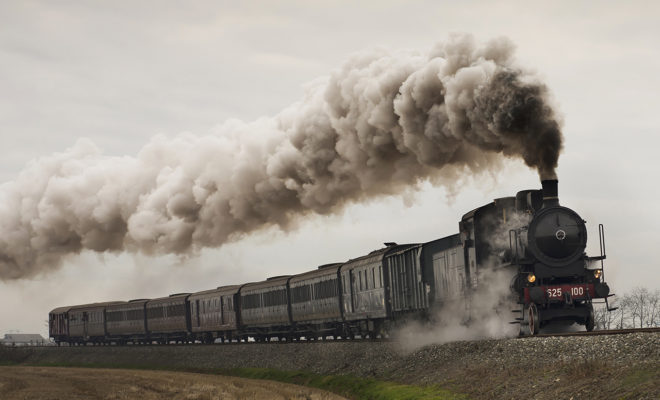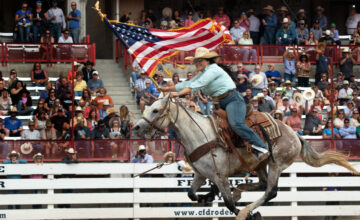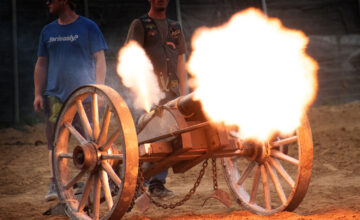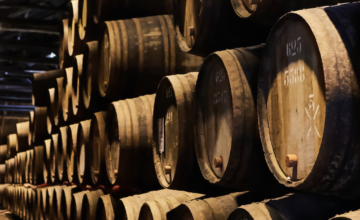by Will Craft
A few hours before the rooster crowed on the second of June in the year 1898, the rooster had not yet crowed. At around 3 a.m., the Union Pacific’s Overland Flyer was hurtling through Wilcox, Wyoming, just North of Rock River. Said Overland Flyer, of Union Pacific Railroad, did not make it much past Wilcox. It took an unscheduled stop, courtesy of Butch Cassidy and the Hole-in-the-Wall-Gang.
When they weren’t prowling the plains, this particular group of outlaws hitched their horses in Johnson County. Numerous gangs set up their hideouts in the Hole in the Wall pass just west of Kaycee, because of the seclusion and defense from lawmen it offered the desperados. Butch Cassidy’s Wild Bunch, Kid Curry, and Black Jack Ketchum frequented the hideout’s cabins and stables to escape from the pressures and law of the, well, law. .
Butback to the not-crowing-rooster. The Hole in the Wall Gang swung a lantern across the train tracks and signaled the Overland Flyer to halt immediately. They should not have done that. But they did do that, and when they did that, three of the gang members climbed into the engine. They forced Grindstone Jones, the engineer of the engine, along with the fireman, whose name we do not know, off of the train. Upon resisting, Grindstone was throttled atop his head with a revolver. He was ok, but he apparently just needed some convincing to disembark.
The fireman ran the Overland Flyer engine a mile westward, over a small bridge traversing a dry creek. Once across, the bridge, previously laden with dynamite, was reduced to twigs, rendering the rest of the train—passengers and all—immobile.
After they were sure the train wasn’t going anywhere, the outlaws made way towards the safe, which ended up going the way of the bridge. Passengers and crew were corralled inside the train, and the gang-members fired shots at both doors. By the time the sheriff’s posse arrived on the scene, the Hole in the Wall Gang had made their escape, with all of the safe’s contents. They were, quite literally, headed for the hills.
This robbery, known as the “Wilcox Holdup,” was covered by newspapers across America, shedding a bit of light on the infamous bandits of the Wild West. Though we can’t be sure which men were involved that morning, we do know a bit about those who hung around the area, causing general havocs.
Butch Cassidy
Obviously, when you’re an outlaw (whether you chose the bandit life or not), you need a name. A name that, when uttered even in the feeblest of whispers, has the power to turn cheese moldy. The name Robert Leroy Parker does not do that. So, Mr. Parker thought, and he thought some more, all while eating stinky cheese. Maybe. However, none of his thinking was very fruitful, and it was in Rock Springs working as a butcher that Parker adopted what came to be
one of the most manly and memorable names we’ve heard: Butch. In honor of an old friend and cattle rusting mentor, he chose the surname Cassidy.
Butch’s first offense was a little strange. He was in a nearby town, and decided he needed some jeans, like, really badly. Much to his disappointment, the clothing shop had closed. However, a strapping lad like himself with questionable influences and a life away from home wasn’t overly discouraged by the closed sign. He entered the shop, stole a pair of jeans and piece of pie, and left an IOU on the table, promising to pay when he found himself in the shop next.
Over the next few years, Cassidy robbed banks, stole horses, bought a ranch, and was briefly jailed in Laramie. Then, he formed the Wild Bunch and became active in the Hole-In-The-Wall gang. The raid on the Overland Flyer created quite the spotlight for Cassidy and his fellows. Eventually, they had to lay low or get out. Cassidy and the Sundance Kid fled to Bolivia, where they spent a few years living a life of crimebefore Butch met his end in November of 1908 in a gunfight.
Sundance Kid
The Sundance Kid was another fellow with a less-than-exciting name: Harry Alonzo Longabaugh. Alonzo? Really?
In 1882, Sundance left his home of Pennsylvania at 15 with his cousin George in a covered wagon. He then ended up in, any guesses? That’s right: Sundance, Wyoming, where a ranch robbery led to some jail time and the adoption of his nickname.
Sundance Kid is known for little other than his involvement with the Wild Bunch and Hole in the Wall Gang, but involved he was. He had quite the reputation as a skilled and speedy marksman, though he doesn’t have any confirmed kills until the shootout in Bolivia where he came to his demise. It’s possible that the reason he never killed was because of his gangs’ aversion to outright violence. They were extremely successful with intimidation and negotiation, though if they had been caught robbing a bank or train, they would’ve been hanged regardless.
Kid Curry
Kid Curry, legal name Harvey Logan, was the less famous “kid” of the Wild Bunch, though we’re not sure that he deserves the credit. Most news articles chronicling the gang’s criminal activity refer to one of the members as “the Kid,” so, perhaps it was Kid Curry the whole time and history has not given him the credit he deserves. . Why weren’t they more specific?ouldn’t those news people track down some more details? Could they not have googled it?
Regardless of credit, Curry was known as a wild man, even to the Wild Bunch. He killed nine lawmen in various shootouts in his short 36 years. The first of which happened in late 1894, when Pike Landusky, a lawman and miner in what’s now Phillips County, Montana, attacked
Logan after a false accusation that he was involved with his daughter Elfie. Turns out, Elfie was actually involved with Kid’s brother, Lonny, but that information came out much too late. After being arrested, beaten, and bailed out, Kid Curry ran into Landusky at a bar, where he gave him quite the knuckle sandwich. Curry was ready to leave, thinking he’d won the fight, when Landusky pulled his gun on the unarmed Harvey Logan. Curry took the gun from his friend Jim Thornhill, and when Landusky’s weapon jammed, put his first lawman down.
It was at Hole in the Wall where Kid Curry met his friend and namesake: “Flat Nose” George Curry.
Flat Nose George
Remember the whole thing about having a name so terrifying it can rot dairy? Well, that’s not the route Flat Nose took, mostly because he didn’t have much of a choice. There’s not a lot of photographical evidence of his schnoz, but the couple of pictures I could dig up certainly explain the moniker. Really though, if someone started calling you “flat nose,” what could you do about it but laugh and just play along?
Ol’ Flat Nose began rustling early in his life, after moving to a Nevada ranch from Canada. Not much is known about his specific activity, other than a couple of reported horse and cattle thefts, as well as involvement with the Wild Bunch. After his train robbin’ days, George headed to the Southwest, where he rustled his last cow in Utah before being caught and shot.
Upon hearing of Flat Nose’s death, Kid Curry, who had ridden with and learned from Flat Nose, rode to Utah to avenge him and his brother, Lonny (the one who was actually involved with Elfie), who had been killed by the deputy of the sheriff who took down George.
What can we take away from all this?
Well, they all got shot. None of them robbed banks until their knees got so bad that they retired to live the rest of their days sippin’ moonshine on their front porches, reminiscing about the good ol’ days. No, they were all dead before any of that could happen.
Did they live a life of excitement? Sure.
Did any of it actually pay off? Not really.
They surely enjoyed their plunder for a while between heists, but these rough and tumble outlaws of the old west really were not good dudes. When your occupation is “outlaw,” you’d maybe think of turning over a new leaf. These men did not. Maybe it was because they never realized their mistakes, but they surely had every opportunity to do so.
The moral (moral, not morale. Morale, accent on second syllable, is a noun meaning “a person’s mental or emotional state.” Moral, accent on first syllable, is either a noun meaning “the lesson from a story”) of the story?
Don’t rob banks or trains, don’t steal people’s horses and cows. It’s just not nice.





John Koster (Contributing Writer to WILD WEST
December 3, 2017 at 11:35 am
Dear Editor:
Would you be interested in a short historical story about Lt. Charles Braden, who Chased Rain-In-The-Face during Custer’s 1873 battles along the Yellowstone, was shot and crippled in a subsequent battle, enduring a heroic effort at rehabilitation, then left the Army to purse two distinct careers: as an editor of West Point yearbook-style publications still important the historians, and as the principal of as West Point Prep school which existed until the 1950s.